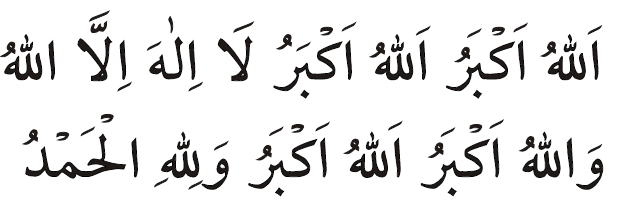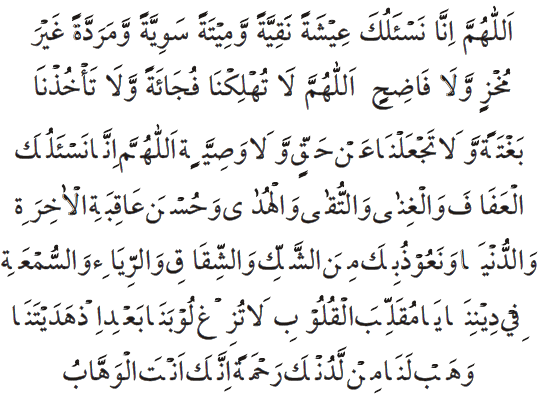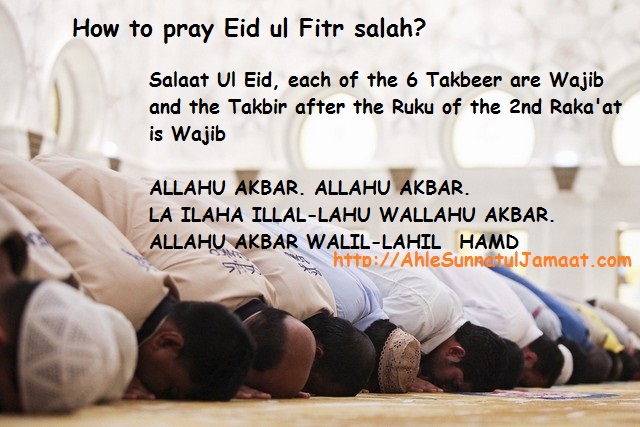What to do on the day of Eid ul Fitr?
The following Sunnah are necessary on the day of Eid:
- To beautify oneself (i.e. have a hair cut, cut one’s nails etc.)
- To have a bath.
- To use Miswak (apart from using it during ablution).
- To offer Salaat Ul Fajr of that day in one’s local mosque.
- To go to the Eidgah (a special place for Salaat Ul Eid) early in the morning.
- To give the Sadqa Fitr and go to the Eidgah.
- To have something sweet (like dates) before going to the Eidgah (if it is dates, then having them in an odd number).
- To offer Salaat Ul Eid in Eidgah.
- To go the Eidgah using one route and returning from another.
- To recite the Takbir ( Allahu Akbar Allahu Akbar La ilaha Illallahu Wallahuakbar Allahu Akbar wa lillahi hamd ) while going to the Eidgah.
- To recite the Takbir softly on EId Ul Fitr.
Caution: Even though it is permissible and allowed to offer the Salaat Ul Eid in a mosque, it is a Compulsory Sunnah (Sunnah Moukkada) to offer it in the Eidgah, as the Holy Prophet Mohammed (صلى الله عليه وسلم ) did not offer it in Masjid Nabawi, even though Masjid Nabawi is superior to all other mosques. (except the Masjid Haraam).
Timing for Salaat Ul Eid/ Eid-ul-Fitr
The time for Salaat Ul Eid starts when the sun rises to the equivalent of a raised spear after dawn, i.e. when the light becomes so strong that you cannot look at the sun directly and ends at high noon ( Dhawaal ).
It is Commendable (Mustahab) to offer it as early as possible. It is better that in Eid Ul Azha, it is offered early and in Eid Ul Fitr, it may be reasonably delayed.
Number of Raka’at in Salaat Ul Eid
In Salaat Ul Eid, there are 2 Raka’at with 6 extra Takbeer and each Takbeer is Wajib.
The method of Eid-ul-Fitr Namaz / Salaat Ul Eid
How to pray eid ul fitr salah:
The method is that first we should make the intention (Niyyah) ( Nawaitu ‘an usalli raka’atai Sallati Eidil Fitri Mo’jam Ausat’a Sitti Tabeerati lillahi Ta’ala )
The Imam should make the intention of Imamat and the follower should make the intention of following the Imam. The give the Takbeer Tahrima and start the Salaat. Recite the Sana. Then both the Imam and the follower should say Allahu Akbar and lift their hands to the level of the ears and drop the hands. After dropping the hands, one should wait for such time as is required for reciting Subhanallah 3 times (but nothing should be recited here) and again repeat for the 2nd and after the 3rd Takbeer, the hands should not be dropped but instead the Salaat should be continued. Then the Imam will complete the first Raka’at as usual.
In the second Raka’at, the Imam will recite the Surah Fatiha and another Surah and then similarly recite Allahu Akbar, raise hands and drop them. Here on the 3rd Takbeer, the hands should be dropped and on the 4th Takbir, without raising the hands, one should perform Ruku.

After the Salaat, the Imam will recite the Khutba (sermon) and it is Wajib for all to listen to it silently. In the Salaat Ul Eid also there are 2 Khutba.
Eid Takbir
ALLAHU AKBAR. ALLAHU AKBAR.
LA ILAHA ILLAL-LAHU WALLAHU AKBAR.
ALLAHU AKBAR WALIL-LAHIL HAMD.
Allah is the Greatest; Allah is the Greatest;
There is no god but Allah Allah is the Greatest.
Allah is the Greatest and all praise is for Him.
Other rules of Salaat Ul Eid
It is Compulsory in Salaat Ul Eid to say the Takbir with the words “Allahu Akbar.” If any other words like Allahu A’adham are used, then the Sajdah Sahw (Sajdah on forgetting) becomes Wajib (For other normal Salaat, the rule is different).
In Salaat Ul Eid, each of the 6 Takbeer are Wajib and the Takbir after the Ruku of the 2nd Raka’at is also Wajib.
The Imam should recite the Takbir loudly and for the follower softly.
Both the Imam and the follower should raise their hands when reciting Takbir.
Even if the Imam does not recite the hands, the follower should raise hands.
If the Imam forgets to recite the Takbir, then the followers also should drop them and follow the Imam.
If the Imam recites extra Takbir, then the followers should follow the Imam for 17 Takbir. After 17 Takbir, the followers should not follow the Imam.
If the Imam and the followers are of different schools of Fiqh, like the Imam is Hanafi and the followers are Shafa’i vice versa, then (in regard to the number of Takbeer and their order and position in Salaat) the follower should do what the Imam is doing.
Dua for Eid Ul Fitr

If any person joins the Eid Salaat at such a time that the Imam has completed the Takbeer, then that person should start his Salaat and immediately say the Takbeer.
If any person joins the Raka’at when the Imam is in Ruku, then if that person believes that he can recite the Takbir and still join the Imam in the Ruku, then that person should first recite the Takbir and then join the Salaat.
If there is a danger that by the time the Takbeer are recited, the Imam will finish the Ruku, then that person should join the Ruku and in the Ruku recite the Takbeer instead of the Tasbeeh of the Ruku, but here the hands should not be raised. If while reciting the Takbeer, the Imam finishes the Ruku, then the Takbeer missed are pardoned.
If any person joins the Salaat in the 2nd Raka’at, then on standing up to complete his Salaat, that person should first complete the recitation of the Holy Quran and then recite the Takbir.
If any person joins the Salaat in the last sitting ( Qaidah ), then that person should offer the Salaat like the Imam i.e. first recite the Sana and then 3 Takbeer and so on.
If any person comes to the Eidgah (or mosque) after the Salaat Ul Eid is completed, then that person cannot offer it alone, as congregation is also a condition for it. But if there are some more people like this, then that person can offer it along with them in a congregation. That person may go to some other place (where it is being offered) and offer it as well.
Similarly, if a person offers the Salaat Ul Eid and realizes that for some reason (e.g. Forgetting Wuzu) his Salaat is invalid, then that person cannot repeat it.
If any mistake is committed in the Salaat Ul Eid, then the Sajdah Sahw will not be offered as because the large number of people, there is danger of misunderstandings being created.
It is Undesirable (Makruh) to offer Supererogatory (Nafl) Salaat before Salaat Ul Eid (either in the house or in Eidgah). However, it is not only not Undesirable, but Commendable (Mustahab) to offer 4 Raka’at after returning from the Eidgah to the house.
This command of not offering Supererogatory prayers is not for all. The common people will never be stopped from offering Supererogatory prayers anytime. This is because they are already lax about it. If they are stopped, they will abandon it altogether.
Likewise offering Supererogatory Salaat before Salaat Ul Eid is Undesirable for women and all others on whom Salaat Ul Eid is not Compulsory.
If a funeral (Janaza) comes at the time of Salaat Ul Eid, then first Salaat Ul Eid will be offered, then Salaat Ul Janazah and then the sermon of Eid.
If Eid and Friday fall on the same day, then both of then will be offered separately as Salaat Ul Eid is Compulsory and Salaat Ul Juma’a is Obligatory.
Rules for the sermon of Eid
The rulings are the same as the sermon of Friday Salaat.
It is established by the Sunnah (Masnoon) to recite 2 Sermons on Eid.
It is Undesirable (Makruh) to say the sermon before Salaat Ul Eid. If, by mistake, someone does it, then it should not be repeated after the Salaat Ul Eid.
When the Imam says the Takbir (Allahu Akbar) in the sermon, the listeners should also repeat it softly.
It is not correct to leave without hearing the sermon. Like the sermon of Friday, the sermon of Eid should also be heard and one should leave only after the sermon ends even if it cannot be heard where one is seated.




